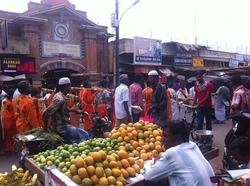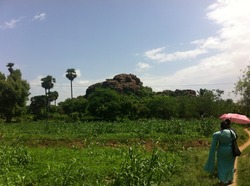Learning alongside Family Care Volunteers in Tamil Nadu
Alec Irwin spent six weeks in the Tamil Nadu region of South India at the Christian Medical College.
"This summer I spent six weeks investigating public health and rural economic development in the Tamil Nadu region of South India. For most of that time, I have been a Visiting Elective Observer at the Christian Medical College (CMC), located in the small city of Vellore.
During such a brief stay, a visitor with limited previous experience in India gathers impressions that are superficial and often contradictory. However, thanks to the generosity and warmth of CMC clinicians, support staff and patients, these weeks have deepened my understanding of the opportunities and challenges of community-based health work and forged ties with Indian colleagues that I hope will endure for years to come.Bazaar district in the town of Vellore
 Bazaar district in the town of Vellore
Bazaar district in the town of Vellore
Many of my most memorable experiences in India have come while accompanying rural health outreach workers associated with a CMC department known as the Rural Unit for Health and Social Affairs (RUHSA). RUHSA was launched in the late 1970s, at a time when movements for community-based primary health care were gathering momentum in many developing countries. From its inception, RUHSA sought to embody a model of health work that empowers community members to actively protect and promote their own health. This approach involves engaging communities in decision-making about clinical services. It also implies building support programs to address underlying social and economic determinants of health, for example through vocational training for rural youth and savings/microcredit plans that reinforce women's economic autonomy.
The key to RUHSA's success is nurturing a strong network of participatory relationships at the community level. RUHSA's relational infrastructure has been built up over decades and extends into the most remote villages of the RUHSA catchment area. For example, in each village, RUHSA has trained a group of women Family Care Volunteers (FCVs), who serve as the institution's "eyes and ears," driving health action at the grassroots level. Because the FCVs are recruited from within local communities, patients do not see these women as outsiders, but as trusted peers. Working closely with visiting nurses who travel the countryside in RUHSA's mobile clinic vans, the FCVs can explain medical problems, treatment options and health-promoting behaviors in ways local people readily understand, and that respect cultural sensitivities.
 FCVs en route to visiting patients in an outlying village
FCVs en route to visiting patients in an outlying village
Many times during my stay here, I have accompanied FCVs and visiting nurses to outlying villages to conduct services such as antenatal care checkups, blood pressure monitoring for diabetes patients, or health education on cervical cancer. The FCVs know every person in their village by name. In this context, service delivery often means visiting patients in their homes; drinking tea together; sharing news about family and village events; and then moving on to the specific health topic at hand, in an atmosphere of intimacy and mutual confidence.
These weeks at CMC have confirmed that the "social capital" embodied in relational networks is a precious resource for health action. I am left with the question of how such a model might be adapted to help reenergize community-based primary care in the United States. I hope that further collaboration with my Indian colleagues and mentors will yield testable hypotheses and delivery strategies to explore this question."
-Alec Irwin, WCMC, MD Class of 2017
Weill Cornell Medicine Center for Global Health
Center for Global Health
420 East 70th Street, 4th Floor, Suite LH-455
New York, NY 10021
Phone: (646) 962-8140
Fax: (646) 962-0285

